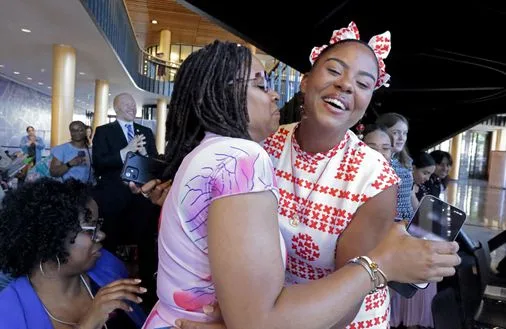
Rosandria Williams, a 32-year-old Boston native, was excited to experience the joys of motherhood. But in a devastating turn of events, she lost her first child to preeclampsia, a disorder that can lead to serious and even fatal complications for both the mother and baby, and affects Black women in the United States at a rate 60 percent higher than white women.
“It opened my eyes to what Black women who experience this trauma go through,” Williams said. When she became pregnant again, “I had to make sure I did everything I could to keep my baby.”
Williams said she found strength in learning more about maternal health, with the help of a Black specialist who taught her vital information such as the benefits of breastfeeding.
These positive experiences during her second pregnancy led Williams to become an avid breastfeeding advocate. On Thursday, she and other local advocates and officials attended a Boston Public Health event to celebrate Black Breastfeeding Week and unveil the new Mamava lactation pod at the Bruce C. Bolling Building in Roxbury.
“Encouraging breastfeeding is a critical part of what we do in public health, it’s one of our top goals, actually,” said Dr. Bisola Ojikutu, executive director of the Boston Public Health Commission. “If you think about the disparities that we know exist, breastfeeding lowers your risk of asthma, obesity, and other diseases.”
However, despite the health benefits, women are often discouraged from breastfeeding due to social stigma and other inequitable practices and policies.
“One of the places that I was offered to pump was the old supply closet. It was dingy. It was not a place where you want to be when you breastfeed,” said Ojikutu, who is a mother to a 7-year-old.
The Mamava lactation pod aims to shrink the health care gap that Black mothers face in Boston by providing a safe and comfortable space for mothers to breastfeed their children.
The spacious white pod, which can be found in the lobby of the community building, can be unlocked by downloading the free Mamava app. The facility has plenty of sitting space, and is also equipped with a mirror, a charging socket, other table-like surfaces, hand sanitizer, and Lysol wipes.
Mamava, a Vermont-based company that specializes in designing freestanding pods for breastfeeding, is responsible for the upkeep of the lactation pod. But to ensure a sanitary environment for all users, mothers are urged to save diaper changes for the bathroom and maintain a clean space.
The movement towards maternal health equity, however, does not end with the lactation pods, advocates said Thursday.
Love For Latch, an initiative by the Boston Healthy Start Initiative, for instance, intends to create an inclusive environment for breastfeeding women in Boston and raise awareness of its importance, according to their website.
“Love For Latch focused on supporting Black women because health outcomes for mothers and children continue to show troubling inequities based on race and ethnicity,” read a statement by Mayor Michelle Wu, who did not attend the ceremony.
“This calls for action across the city to increase awareness and reduce stigma, strengthen support, and foster supportive workplaces to improve the integration of breastfeeding support services within our communities,” the statement read.
Similarly, over the past year, Wu and the Mayor’s Office of Women’s Advancement launched the Postpartum Education and Support Group pilot in partnership with Love Your Menses.
The program aimed to educate Boston residents, particularly Black and brown women who have recently given birth or are expecting to give birth soon, and to create a safe space for people experiencing pregnancy and postpartum.
“Through this program, we’ve been able to support so many women across the city to obtain educational support, and at the same time learn how to advocate for themselves and whether they’re in a hospital setting,” said Alexandra Valdez, executive director of the Mayor’s Office of Women’s Advancement. “We trained over 25 women who now have come together and created their own village of support.”
As attendees left the ceremony, powerful photos of mothers breastfeeding adorned the room; among them was a moving portrait of Williams and her 2-year-old daughter, Rose.
“Now that I work with women who have children I feel like it is up to me to help them learn about breastfeeding,” said Williams.
“It’s your choice, it’s up to you, but you should still have the knowledge,” she said, “So I always like to tell my personal experience.”
Emma Obregón Dominguez can be reached at emma.obregon@globe.com. Follow her on Instagram @eobredom.

